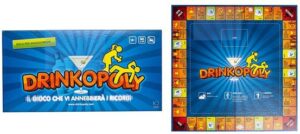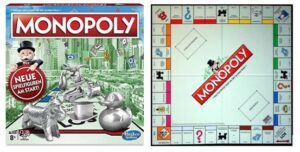Re-filing of brands – MONOPOLY
The case: The American game producer Hasbro owned three EU trade marks for the word MONOPOLY, with each mark being registered for different goods. The company then registered a new EU trade mark for the word MONOPOLY, which combined the lists of goods of the previous marks into one registration. Hasbro did not have its previous trade marks cancelled. Did the company therefore risk being accused of having made a re-filing for its previous trade marks in bad faith for its previous trade marks in bad faith? And did that mean the new trade mark would be cancelled?
This question arose in a commercial dispute involving Croatian game manufacturer Kreativni Dogadaji, which, 12 days after Hasbro’s new application, applied for the registration of the sign

for games and then extended this registration to the European Union. Kreativni Dogadaji subsequently used the sign for a competitive game:

Hasbro saw the DRINKOPOLY mark as a threat to its sign MONOPOLY and filed an opposition in respect of the registration of DRINKOPOLY. This was based, inter alia, on the new MONOPOLY trade mark, which was 12 days older, and on a trade mark protected only in the UK for the word MONOPOLY. Hasbro did not base its opposition on its EU trade mark, which was 10 years older and protected for games.
Kreativni Dogadaji defended itself and in response applied for the cancellation of the new MONOPOLY trade mark on grounds of abuse of rights.
The Court of Justice of the European Union upheld Kreativni Dogadaji. Hasbro had filed the new application in bad faith. It was done with the intention of not having to prove the use of the sign MONOPOLY. EU Trade marks must be used five years after registration. If this does not happen, they lose their rights and can be cancelled. This system is intended to reconcile the interests of the trade mark owner, to whom the trade mark grants a monopoly on a designation, with the interests of the other market participants. However, by applying for a new trade mark for the same content as the previous trade mark, in order to obtain a new five-year period in which to start to use a sign, is not compatible with the objectives of the law.
Hasbro claimed that it had only followed the advice of its lawyers, that it was common practice and that it could not have been done in bad faith. Moreover, it was clear that Hasbro could prove the use of its MONOPOLY trade mark for games, not least by way of its famous board game:

When asked about its intentions in making its application, Hasbro admitted that a benefit of its re-filing activities was that significant effort would be saved in terms of providing time-consuming evidence of use. It argued that it was superfluous and economically unreasonable to have to make such an effort for old marks when the result had already been determined and such efforts were not necessary for the new mark.
The court did not accept this reasoning. For a trade mark application to be in bad faith, only the intention of the applicant mattered, not the advantages gained or the damage caused by their actions. Hasbro’s intention had been to override the statutory use regime. This was also demonstrated by the fact that Hasbro had not cancelled its old marks and that the new mark had been used as a means of attack, taking advantage of the legal benefits.
The new MONOPOLY trade mark was cancelled, inter alia, for games because Hasbro had acted in bad faith when filing its application. As certain individual goods were not identical to the goods encompassed by the earlier marks, the new application for them was upheld, General Court of the European Union 21.04.2021, T-663/19. By order of 01/12/2021, the European Court of Justice refused to allow Hasbro’s appeal against this judgment to proceed, C-373/21 P.
The opposition proceedings initiated by Hasbro against the DRINKOPOLY trade mark had been successful at first instance. However, the registration of DRINKOPOLY as an EU trade mark has not yet been definitively refused because further hearings are still pending.
Learnings: Re-filing is not prohibited per se. However, if you are re-filing, you need very robust reasons for the new registrations. Therefore, check carefully whether you might be accused of intending to circumvent the legal regulations concerning use. If that might be the case, it will not help you to argue that this is industry practice, nor will it assist if your lawyers have advised you to take such a step.